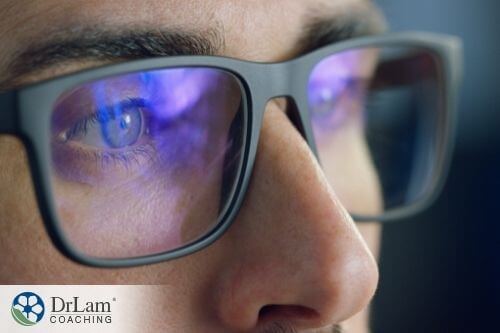As a society, we depend on electronic devices more and more for communication, sharing information, and getting news. After the Covid-19 pandemic required people to stay home, for the most part, that dependency increased. But what about the potential health problems associated with the blue light emissions coming from all those electronic devices? And what about the blue light glasses you see advertised so often? Do they work? Are they needed?
This article will explore these questions and seek to provide some answers.
 Blue light consists of the visible light found at the blue end of the light spectrum. Some concern exists among scientists that longer exposure to the short wavelengths of blue light from electronics may cause more harm to your cells than the longer wavelength visible light you can see as red through green in color. In addition, research findings suggest blue light can interfere with your sleep-wake cycle.
Blue light consists of the visible light found at the blue end of the light spectrum. Some concern exists among scientists that longer exposure to the short wavelengths of blue light from electronics may cause more harm to your cells than the longer wavelength visible light you can see as red through green in color. In addition, research findings suggest blue light can interfere with your sleep-wake cycle.
However, other professional organizations such as the American Academy of Ophthalmologists say the blue light from your electronic devices does not damage your eyes. Consequently, this organization also says blue light glasses are not helpful or necessary.
Recent studies show the pandemic has led people to spend more time looking at electronic devices of all kinds. While this in itself does not prove blue light causes health problems, the increase in time spent on these devices does increase the risk of physical harm. Moreover, this increase in exposure to blue light includes more exposure at bedtime, which leads to more interference with the sleep-wake cycle.
A growing body of research shows that blue light strongly inhibits the production of melatonin, a hormone essential for sleep and one that acts as a central regulator of circadian rhythms. The research shows that blue light suppresses melatonin more than two times as long as longer wavelengths of light.
In addition, blue light stimulates the production of cortisol, one of the major hormones that keep you alert.
Blue light not only shortens the amount of sleep you get, but it also causes more night-time awakenings. As a result, you may feel more fatigued the next day.
Significant research suggests that blue light can cause unique and direct damage to the cells in your eyes. The high-energy light can pass through your cornea and lens in your eye right to the retina. This type of light can lead to dry eye, cataracts, and age-related macular degeneration.
Likewise, some recent research indicates blue light exposure can increase your risk of developing some types of cancer, such as breast and prostate cancers. This increased risk comes from exposure to blue light at night. For example, the research showed an increase of 1.5 to 2 times higher risk of breast and prostate cancers, respectively, when compared to those not exposed to blue light.
In addition, some emerging research suggests a connection between blue light exposure and obesity as well as diabetes.
Chronic stress is an unbiqitous problem in our world today and can lead to. If you have this condition, it comes with an array of hard-to-indentify symptoms that can worsen or interact with how your body is affected by blue light.
A brief discussion of AFS and NEM will enable you to better understand the effects of blue light on your symptoms.
 Adrenal Fatigue Syndrome (AFS) is a health condition that results when your adrenal glands become overwhelmed with the demand for their hormones to fight chronic stress. Normally, your adrenals will produce and release sufficient amounts of these hormones to fight the effects of stress. Then, when the stress resolves, this production reverts back to normal levels. However, when stress becomes chronic, your adrenals can become fatigued and unable to supply sufficient amounts of hormones. This begins AFS symptoms.
Adrenal Fatigue Syndrome (AFS) is a health condition that results when your adrenal glands become overwhelmed with the demand for their hormones to fight chronic stress. Normally, your adrenals will produce and release sufficient amounts of these hormones to fight the effects of stress. Then, when the stress resolves, this production reverts back to normal levels. However, when stress becomes chronic, your adrenals can become fatigued and unable to supply sufficient amounts of hormones. This begins AFS symptoms.
The NeuroEndoMetabolic (NEM) stress response is how your body globally responds to stress. It consists of six interconnected circuits of three organs or systems each that work to keep your body's functions in balance. In the face of chronic stress, any number of these circuits can become dysregulated, leading to serious symptoms.
The potential health problems brought on by increased exposure to blue light can significantly increase your symptoms of AFS.
For example, when you suffer from AFS, sleeplessness is a significant symptom. Not getting sufficient quality sleep leads to a feeling of fatigue the next day. Fatigue makes up one of the signature symptoms of AFS. Increased exposure to blue light, especially at bedtime, results in increased difficulty sleeping.
The emerging research indicating a connection between exposure to blue light and obesity and diabetes suggests an impact on the bioenergetics, detoxification, and inflammation circuits of the NEM. A dysregulation in the bioenergetics circuit can result in central obesity which can worsen with blue light overexposure. In addition, in advanced stages of AFS, this kind of dysregulation can lead to type 2 diabetes, potentially made worse by blue light exposure.
Dysregulation of the hormone circuit can cause hormone imbalance which also can worsen with increased exposure to blue light.
Because of the inter-relatedness of the circuits of the NEM, the detoxification and inflammation circuits will also feel the effects of increased blue light exposure through its effects on the bioenergetics circuit. Therefore, you can experience an imbalance in the bacteria living in your microbiome and the potential for leaky gut to develop. This would lead to an overactive immune system, increased inflammation, and autoimmune disorders.
On the other hand, research also shows blue light glasses bring significant benefits to those exposed to this kind of harmful light. Much of this growing body of research points out the benefit of blue light glasses blocking blue light and improving or restoring good sleep and normalizing circadian rhythms.
Proponents of blue light glasses say they can:
 There is considerable controversy regarding whether you really need blue light glasses.
There is considerable controversy regarding whether you really need blue light glasses.
The American Academy of Ophthalmologists not only says you don’t need them, but it also goes on to say blue light actually doesn’t cause eye strain or any other type of health issue. Their stance is that complaints from people about these issues really stem from overuse of electronics and not from blue light itself.
The United Kingdom’s College of Optometrists denies the use of blue light glasses does anything to relieve any eye strain or physical consequences of blue light. Other professionals also regard blue light glasses as having no benefit.
Several professional organizations propose the following ideas:
There are significant differences of opinion among professionals regarding whether you need blue light glasses and whether they actually work. These glasses have only recently found more widespread use.
If further research validates the recent findings that blue light does, indeed, have a detrimental effect on eye and overall health, you need to know the potential impact on your body. This is even more important if you suffer from AFS and have some dysregulation of one or more circuits of the NEM.
If you are considering using blue light glasses, here are a few suggestions:
Whatever course of action you decide to take, however, please do so with the guidance of your healthcare professional who can help you identify symptoms and options you have.
If you would like to know more about or need assistance with the effects of blue light and the need for blue light glasses, the team at Dr. Lam Coaching can help. We offer a free** no-obligation phone consultation at +1 (626) 571-1234 in which we will privately discuss your symptoms and various options. You can also send us a question through our Ask The Doctor system by clicking here.
Blue light glasses appear to be of benefit in decreasing harmful blue light emitted from the screens of electronic devices. This blue light can bring on eye strain, direct damage to cells in your eyes, decrease your information processing speed, and may have some links to obesity, diabetes, and cancers.
